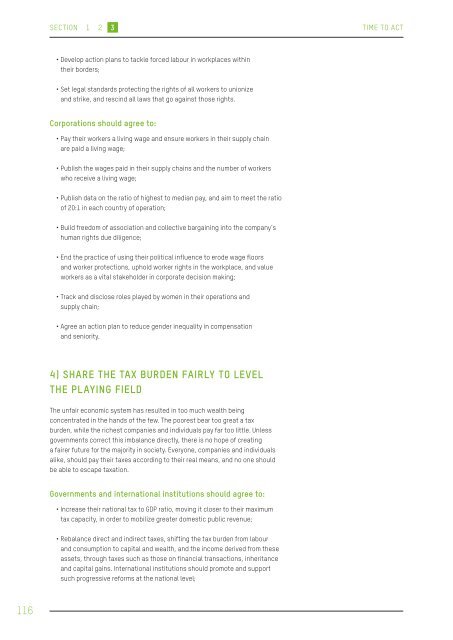1FW2e8F
1FW2e8F
1FW2e8F
Create successful ePaper yourself
Turn your PDF publications into a flip-book with our unique Google optimized e-Paper software.
SECTION 1 2 3<br />
TIME TO ACT<br />
• Develop action plans to tackle forced labour in workplaces within<br />
their borders;<br />
• Set legal standards protecting the rights of all workers to unionize<br />
and strike, and rescind all laws that go against those rights.<br />
Corporations should agree to:<br />
• Pay their workers a living wage and ensure workers in their supply chain<br />
are paid a living wage;<br />
• Publish the wages paid in their supply chains and the number of workers<br />
who receive a living wage;<br />
• Publish data on the ratio of highest to median pay, and aim to meet the ratio<br />
of 20:1 in each country of operation;<br />
• Build freedom of association and collective bargaining into the company’s<br />
human rights due diligence;<br />
• End the practice of using their political influence to erode wage floors<br />
and worker protections, uphold worker rights in the workplace, and value<br />
workers as a vital stakeholder in corporate decision making;<br />
• Track and disclose roles played by women in their operations and<br />
supply chain;<br />
• Agree an action plan to reduce gender inequality in compensation<br />
and seniority.<br />
4) SHARE THE TAX BURDEN FAIRLY TO LEVEL<br />
THE PLAYING FIELD<br />
The unfair economic system has resulted in too much wealth being<br />
concentrated in the hands of the few. The poorest bear too great a tax<br />
burden, while the richest companies and individuals pay far too little. Unless<br />
governments correct this imbalance directly, there is no hope of creating<br />
a fairer future for the majority in society. Everyone, companies and individuals<br />
alike, should pay their taxes according to their real means, and no one should<br />
be able to escape taxation.<br />
Governments and international institutions should agree to:<br />
• Increase their national tax to GDP ratio, moving it closer to their maximum<br />
tax capacity, in order to mobilize greater domestic public revenue;<br />
• Rebalance direct and indirect taxes, shifting the tax burden from labour<br />
and consumption to capital and wealth, and the income derived from these<br />
assets, through taxes such as those on financial transactions, inheritance<br />
and capital gains. International institutions should promote and support<br />
such progressive reforms at the national level;<br />
116


